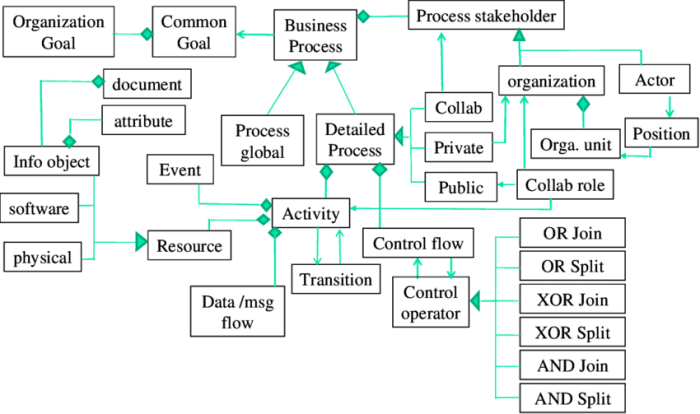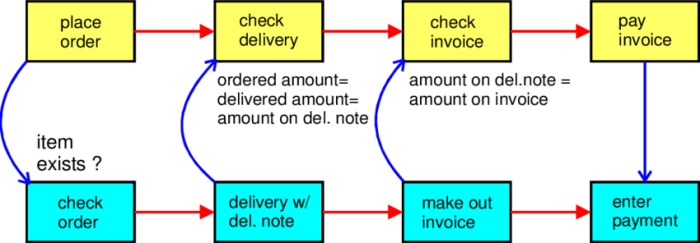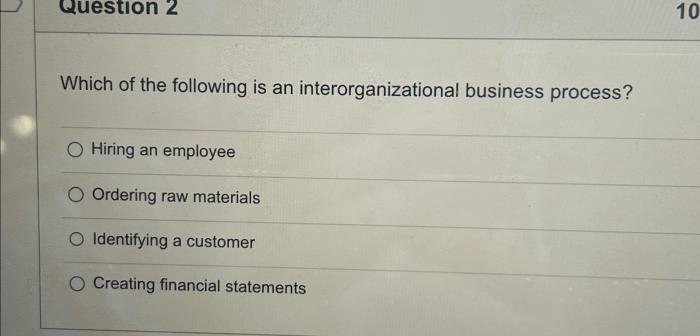Which of the following is an interorganizational business process? This question delves into the realm of collaborative endeavors that transcend organizational boundaries, where businesses join forces to achieve shared objectives. Interorganizational business processes are the lifeblood of modern commerce, enabling seamless information exchange, resource sharing, and synchronized operations across multiple entities.
In this comprehensive guide, we will explore the intricacies of interorganizational business processes, unraveling their types, benefits, challenges, and real-world applications.
Interorganizational business processes are distinct from traditional intra-organizational processes, as they involve multiple independent organizations working together. This collaboration necessitates a high level of coordination, trust, and shared understanding among the participating entities. By breaking down organizational silos and fostering inter-enterprise cooperation, these processes unlock a wealth of opportunities for innovation, efficiency gains, and enhanced customer experiences.
1. Interorganizational Business Process Definition

An interorganizational business process is a sequence of activities that involves multiple organizations working together to achieve a common goal. These processes typically involve the exchange of information, goods, or services between the organizations involved.
Interorganizational business processes are distinct from other types of business processes in that they require the collaboration of multiple organizations. This collaboration can be complex and challenging, but it can also lead to significant benefits for the organizations involved.
2. Types of Interorganizational Business Processes

There are many different types of interorganizational business processes. Some of the most common include:
- Supply chain management
- Customer relationship management
- Product development
- Order fulfillment
- Billing and payment
Each type of interorganizational business process has its own unique characteristics. For example, supply chain management processes involve the coordination of activities between suppliers, manufacturers, and distributors. Customer relationship management processes involve the management of interactions between a company and its customers.
Product development processes involve the collaboration of multiple organizations to design and develop new products.
3. Benefits of Interorganizational Business Processes

There are many potential benefits to implementing interorganizational business processes. Some of the most common benefits include:
- Improved efficiency
- Reduced costs
- Enhanced customer satisfaction
- Increased innovation
- Improved competitiveness
Interorganizational business processes can help to improve efficiency by eliminating duplicate activities and streamlining processes. They can also help to reduce costs by sharing resources and leveraging economies of scale. Enhanced customer satisfaction can be achieved by providing customers with a seamless experience across multiple organizations.
Increased innovation can be achieved by bringing together the expertise of multiple organizations. Improved competitiveness can be achieved by responding more quickly to changes in the market.
User Queries: Which Of The Following Is An Interorganizational Business Process
What is the primary characteristic that distinguishes interorganizational business processes from other types of business processes?
The defining characteristic of interorganizational business processes lies in their cross-organizational nature, involving multiple independent organizations working together to achieve shared objectives.
What are some common types of interorganizational business processes?
Interorganizational business processes encompass a wide range of activities, including supply chain management, joint product development, customer relationship management, and inter-firm knowledge sharing.
How can interorganizational business processes benefit participating organizations?
These processes offer numerous benefits, such as improved efficiency through resource sharing, reduced costs due to economies of scale, enhanced innovation through cross-fertilization of ideas, and increased customer satisfaction through seamless inter-enterprise collaboration.
What are some of the challenges associated with implementing interorganizational business processes?
Challenges include managing inter-organizational dependencies, ensuring data security and privacy, overcoming cultural and organizational differences, and establishing effective governance mechanisms.
